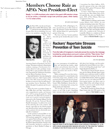Many Americans may assume that Muslim extremists get the inspiration to engage in suicide bombing from the words of the Koran, the holy book of Islam. The genesis of their motivation to martyr themselves, however, reaches back much further in history—to Judaism around 170 B.C.
So argued Naomi Janowitz, Ph.D., at the January meeting of the American Psychoanalytic Association in New York City.
In fact, all forms of Muslim and Christian martyrdom hark back to Judaism of this period, she contended.
Janowitz is chair of religious studies at the University of California at Davis and a candidate at the San Francisco Psychoanalytic Institute. She is also the winner of the American Psychoanalytic Association's 2004 competition for the best essay on psychoanalysis and culture. Her essay is titled“ Lusting for Death: Some Unconscious Meanings of Martyrdom Traditions.”
More than 2,000 years ago in the Judaic world, Janowitz reported, animal sacrifice was a way of atoning for one's sins, of becoming reconciled with God. Then someone or some group came up with the idea of replacing animal sacrifice with human sacrifice. The notion was that “you had to go one up from an animal”—that animal sacrifice was not enough to make amends for the sins that Jewish people committed.
Exactly when human sacrifice started to replace animal sacrifice is not known, she continued. However, the first chronicle of Jewish martyrdom can be found in the Book of Second Maccabees in the Bible, in which a mother and her seven sons die rather than agreeing to the demand of a king that they eat pork. These instances of martyrdom probably occurred between 175 B.C. and 165 B.C., although the text was probably written 50 to 100 years later.
Moreover, such cases of martyrdom would not have occurred if those committing them had not believed in an afterlife, Janowitz asserted. The mother in the Maccabees story, upon urging her sons to accept martyrdom, cries that “the Creator of the world. .will in his mercy give life and breath back to you again since you now forget yourselves for the sake of his laws....”
In addition, martyrdom was based not only on the expectation of an afterlife, but on the anticipation of being united with one's mother, Janowitz said. The mother in the Maccabees story, upon urging the last of her seven sons to accept martyrdom, exclaimed, “Accept death, so that in God's mercy I may get you back again along with your brothers.”
And in a deeper sense, martyrdom represents hope of being united not only with one's mother, but with a divine father, Janowitz declared. In the Maccabees story, no mention is made of a father, suggesting that the biological father was replaced by a divine one.
Finally, animal sacrifice had been an exclusively male preserve, a patriarchal system, where women were not allowed to participate, Janowitz pointed out. But when some Jews moved from animal sacrifice to human sacrifice, women got involved as well. Also, a number of Christian martyrs throughout the ages have been women, as are some of today's Islamic extremist suicide bombers.
All in all, Janowitz concluded, martyrdom is crucial to the Jewish, Christian, and Islamic traditions, and the phenomenon, which emerged more than 2,000 years ago, still “haunts headlines today.” ▪
